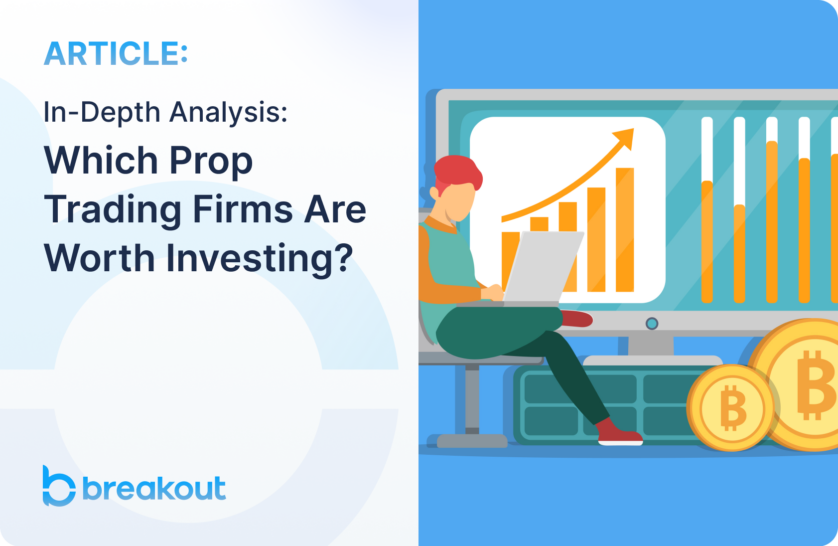


By executing trades using someone else’s starting capital, prop traders needn’t risk their own funds.
Prop trading gives traders the luxury of simply focusing on their trades and nothing else.
Firms relieve traders of the burden of adhering to regulatory requirements and administration, enabling them to focus exclusively on executing their strategies.
Choosing the right prop trading firm can be a daunting task, especially as proprietary trading firms support diverse ranges of financial instruments, differ in their profit split arrangements, and enforce distinct risk management rules. In this comprehensive guide, we aim to assist you in making an informed decision.

In recent times, prop trading has carved a niche for itself among individuals seeking to invest in various financial markets. Prop trading, or proprietary trading as it’s more formally known, is essentially a scenario where a financial firm or brokerage provides substantial starting capital to traders for executing their trading strategies. This is not merely an act of generosity: the prop firm retains a minor share of the profits (typically around 10-20%), allowing traders to pocket the bulk of the profits generated.
But what makes prop trading so appealing? How does it set itself apart from independent investing?
To answer these questions, let’s delve deeper into why many prop trading firms are worth investing in and how they differ from other financial institutions like investment banks and hedge funds.
Proprietary trading firms offer traders significant capital, or ‘prop’ to start trading. This eliminates the need for traders to risk their own money or client funds, a norm followed by asset management firms and large banks. Instead, traders can focus on honing their trading skills and knowledge about market opportunities without worrying about personal financial losses.
This is especially pertinent in crypto markets, where using a prop firm can allow traders to trade crypto without needing to deposit their funds on an exchange, which comes with increased counterparty risk, custody risk, clawback risk, and more.
One fundamental way that proprietary trading firms differ from other investment options is their emphasis on risk management. While futures traders and forex traders may have their own ways of managing risks associated with market liquidity or market activity, prop firms provide structured guidelines and support to help mitigate potential losses.
Moreover, proprietary trading firms often offer advanced tech infrastructure, including state-of-the-art trading platforms and software that aid in trading. These features make it easier for both new and experienced traders to navigate financial markets effectively.

Another unique aspect of proprietary trading is that it provides opportunities for all types of traders – whether they prefer technical analysis, futures trading, options trading, or other trading styles. This diversity is not commonly found in hedge funds or asset management firms, making the proprietary trading space highly appealing to professional traders.
Proprietary traders are also relieved of administrative burdens related to regulatory compliance, a task typically handled by the firm itself. This allows traders to concentrate solely on their trading activities and strategies.

Prop trading firms offer traders an ideal platform for trading success. The best prop trading firms provide a robust support system—from advanced technology to risk management protocols—that can significantly enhance a trader’s career prospects. If you’re an everyday trader looking to take your trading potential to the next level, joining a prop firm could be the right move for you.
Remember, though, that every prop firm has its own unique evaluation process, and not all are created equal. It’s essential to research thoroughly and choose wisely before stepping into the prop trading world. Always keep in mind that while the rewards can be great, so too can the risks.
Reputable proprietary trading firms extend significant capital, often up to $400,000, to jumpstart a trader’s journey in diverse financial markets. Such an opportunity may be inaccessible to many, marking the first major advantage of aligning with a prop firm.
Trading in various financial markets is notoriously volatile, with an estimated 95% of traders proving unsuccessful within their initial two years. By leveraging the firm’s capital provided by prop trading firms, traders effectively eliminate one of their most significant risks: depleting their own money.
Engagement with a prop trading firm that allows traders to retain 90% of the resulting profits can lead to lucrative returns. Especially when compared to trading with one’s own limited starting capital and retaining all profits. This is why many skilled traders are drawn to the best prop trading firms.
In the prop trading space, the ability to manage risk is paramount. Strategies for market making and risk management are key components that differentiate proprietary trading firms from hedge funds or asset management firms. In essence, a prop trader uses a firm’s capital to trade financial instruments for the firm’s account, unlike investment banks that trade client funds or hedge funds that trade client assets.
Comparatively, other financial institutions, such as large banks or brokerage firms, might not offer such high starting equity or favorable profit split arrangements as found in proprietary trading firms. This shows how proprietary trading firms differ from other entities in the financial world.
Yet, choosing amongst top prop trading firms can be tricky as they support different assets, offer unique profit splits, and impose their own risk management rules. Proprietary trading firms also vary in terms of their evaluation process and the amount of training they provide to enhance their traders’ skills.

For those considering futures trading or forex trading, it’s important to note that many prop trading firms provide advanced trading platforms tailored specifically for these types of trades. These platforms often come equipped with state-of-the-art trading technology and sophisticated trading software, offering traders a competitive edge in the market.
Prop trading offers a host of benefits. From substantial starting capital and favorable profit splits to professional training and advanced tech infrastructure, each of these factors plays a crucial role in the trading success of proprietary traders, making prop trading firms an attractive option for both new and experienced traders alike.
Proprietary trading, or prop trading, involves the use of a financial institution’s own capital to trade in various financial markets. It’s an avenue where prop traders, backed by proprietary trading firms, navigate the tumultuous seas of financial markets, making use of the firm’s capital rather than their own money.
The audition process at many prop trading firms is a rigorous evaluation process, designed to test the trading skills and knowledge of aspiring traders. This process is like a proving ground, where skilled traders with a good understanding of risk management, market data interpretation, and algorithmic trading are identified.
After successfully proving their mettle, these traders are entrusted with significant capital by the prop trading firm, often upwards of $400,000. This is where proprietary trading firms differ from traditional investment banks or asset management firms. While the latter usually handle client funds and assets, prop traders are given free rein to trade using the firm’s capital.

In conducting their trades, these professionals may choose from a diverse range of financial instruments: futures contracts on commodities, options contracts on stocks, foreign exchange (forex) pairs, and more. This freedom to operate across diverse markets is one of the unique advantages offered by prop trading.
Apart from providing starting capital, top prop trading firms also equip their traders with advanced tech and infrastructure for market making. Traders get access to state-of-the-art trading platforms that incorporate diverse order types, customization, and technical indicators – all in one place. Such resources might be beyond reach for an everyday trader operating on their own account.
By joining a proprietary trading firm, aspiring traders get access to resources for honing their trading strategies and gaining experience in various financial markets. Proprietary traders are not just employees; they’re partners sharing in the success of the firm. Trading success means a profit split between the trader and the firm.
However, not all prop firms operate identically. Some offer better terms, others have a more extensive range of financial instruments to trade, and yet others might prioritize certain trading styles. There is also a lot of variation regarding rules, payouts, performance targets, and more.
Therefore, it’s important for traders to choose the best prop trading firm that aligns with their trading style and career goals.

Prop trading firms offer an unparalleled platform for traders – both new and experienced – to jumpstart their trading careers without risking their own capital. They provide opportunities to learn, grow, and profit in the competitive world of financial trading while also providing the flexibility to manage risk according to their comfort level. Proprietary trading is indeed a viable route for those seeking a rewarding career in financial markets.
Upon joining a proprietary trading firm, traders are subjected to an evaluation process, which serves as a litmus test for their trading skills. Proprietary traders must demonstrate their proficiency in a simulated trading environment that mirrors the actual financial markets. Passing this rigorous test without breaching daily loss limits or the firm’s risk management protocols signifies a green light to accessing a fully funded prop account.

The audition phase at prop trading firms is not only geared towards ensuring the firm’s capital isn’t entrusted to unskilled traders but also serves as a learning curve for the traders themselves. Unlike independent traders, prop traders within these proprietary trading firms gain access to advanced demo environments. Here, they can assess their trading strategies’ robustness without real financial risk. The insights garnered during this phase equip the trader with significant capital management knowledge for their future trading activities, both within and outside of the prop trading space.
In this setting, prop trading firms differ from traditional financial institutions like investment banks or brokerage firms, where such comprehensive onboarding processes might not be in place. This unique approach adopted by many prop trading firms provides an inclusive platform for both experienced traders and those at the start of their trading careers.
Given that these firms operate across various financial markets—futures trading, forex trading, and options trading, among others—it allows traders to diversify their portfolio and improve their proficiency with different financial instruments. Leading proprietary trading firms leverage state-of-the-art technology and sophisticated software to provide traders with resources that might otherwise be inaccessible or prohibitively expensive.
Moreover, proprietary traders are relieved from managing client funds or risking their own money as they get to trade stocks and other financial instruments using the firm’s capital. This unique feature makes prop trading an attractive option for traders looking to focus solely on enhancing their trading skills and knowledge without worrying about the administrative and regulatory aspects.
Prop trading offers immense potential for personal growth and trading success. With the support of a prop firm, traders can focus exclusively on their trading activities, hone their risk management skills, and significantly increase their market knowledge. It’s safe to say that a trader’s journey with a proprietary trading firm could be more profitable than trading on their own account, given the wealth of resources and support available.

So, whether you’re an everyday trader or looking to kickstart your trading career, exploring the dynamic world of prop trading could be worth considering. From a diverse range of financial markets to advanced tech and infrastructure, as well as opportunities for personal growth – the benefits are manifold. However, remember that, like any other form of trading, prop trading requires discipline, strategic planning, technical analysis skills, and an understanding of market liquidity.
Joining a prop firm doesn’t guarantee overnight success, but it certainly provides a conducive environment for traders to prove their mettle and grow their trading potential. It’s all about how much risk you’re willing to manage and how effectively you can leverage the resources provided by these prop firms to maximize your profit split. As they say in the world of finance, – higher the risk, the higher the reward.
In essence, being part of a proprietary trading firm is more than just about accessing significant capital or sophisticated software; it’s about becoming part of a community that fosters learning and growth while also providing opportunities to make substantial profits from market activity.
Proprietary trading, often referred to as prop trading, offers a unique opportunity for both novice and professional traders to immerse themselves in various financial markets without risking their own money or facing any liability for potential losses.
Prop traders are given access to significant capital, as high as $400,000, which they may not have had otherwise. This access is granted by proprietary trading firms after an intensive evaluation process wherein the trader’s skills and trading knowledge are put through rigorous tests. The evaluation involves an audition where the trader is placed in a simulated demo trading environment that mimics real-world market conditions.
The essence of this audition process is not only to protect the proprietary trading firm from handing over funds to irresponsible traders but also to serve as a learning curve for the traders themselves. This scenario offers prop traders an opportunity to test their trading strategies without any real risk. The lessons learned during this phase are invaluable and will undoubtedly benefit the trader throughout their trading career.
Proprietary trading firms differ from investment banks and hedge funds in that they do not trade with client funds but with their own capital. Unlike these other financial institutions, prop firms offer full support regarding regulatory and administrative concerns. This allows prop traders to focus solely on their trades without the burden of navigating complex regulatory landscapes.

Furthermore, prop traders are provided with sophisticated trading platforms, which are usually reserved for top-tier exchanges. These platforms provide access to market data necessary for technical analysis, enabling traders to identify market opportunities and manage risk effectively.
Many prop trading firms offer a diverse range of financial instruments, including futures trading and forex trading, among others. The freedom to trade across different markets enhances market liquidity and allows prop traders to leverage their trading skills optimally.
Moreover, unlike asset management firms or brokerage firms, where the everyday trader might struggle with signing up, and large banks, where market making can be arduous, prop trading firms make it easy for traders with their user-friendly interfaces.
It’s worth noting that to be successful in the prop trading space, traders need to demonstrate their trading potential by proving their ability to stay within daily loss limits and adhere to the firm’s risk management rules. Successful traders are then granted funded accounts and can start trading real money.
Undoubtedly, a career in prop trading offers significant advantages over trading one’s own account. Not only do traders get the chance to trade with a firm’s capital, but they also receive the added bonus of having access to top-notch trading software, market-making tools, and high-frequency trading capabilities.

Prop trading is an attractive prospect for both experienced traders and those just beginning their journey in financial markets. The support provided by prop firms, access to a broad range of financial instruments, and opportunities for growth make prop trading an appealing choice for many.
Proprietary trading offers an appealing opportunity for both novice and professional traders, permitting them to delve into the diverse range of financial markets without staking their own capital – and without bearing responsibility for potential losses.

Prop traders benefit from the extensive accessibility granted by top-tier trading platforms, eliminating the hassles associated with registration for exchanges and independent navigation through regulatory matters.
Possessing access to significant capital up to $400,000 that they may not have otherwise, prop traders hold the potential to venture into various financial markets with enhanced strength, conviction, and safety compared to the everyday trader.
These skilled traders can engage in futures trading, forex trading, options trading, or trading other financial instruments available on the market. They can partake in high frequency trading or stick with traditional methods, depending on their individual trading style and the firm’s own rules and preferences.
The best prop trading firms provide an environment where traders can refine their trading skills and gain valuable trading knowledge. This is often achieved through a simulated demo environment where trades are executed without any real risk, allowing traders to evaluate the robustness of their strategies before they start trading with live funded accounts.
Proprietary trading firms differ from hedge funds and asset management firms in that they don’t manage client assets or trade with client funds. Instead, they use their own resources and trade on their firm’s capital. This investment model allows such firms to manage risk effectively while maximizing market opportunities. Robust risk management in prop trading is crucial, as these firms must have stringent protocols in place to safeguard their capital.
Regulatory and administrative support is a key feature of prop trading firms. They handle all the regulatory requirements behind the scenes, allowing traders to concentrate solely on their trading activities without having to worry about compliance issues.
As mentioned, most pertinent to crypto trading, prop firms allow trading of these instruments without the traders needing to deposit their own funds on a centralized exchange.

Moreover, it’s important to note how proprietary trading firms differ from investment banks. While investment banks trade on behalf of their clients, proprietary trading firms trade with their own capital. This means that prop traders are not required to sell securities to clients or buy them on their behalf.
Whether it’s through algorithmic trading, technical analysis, or relying on real-time market data, prop traders prove their trading success by leveraging their skills and the resources provided by proprietary trading firms.
In conclusion, prop trading offers an advantageous platform for traders to grow, develop their strategies, and achieve trading success, all while enjoying the benefits of substantial support from prop trading firms.